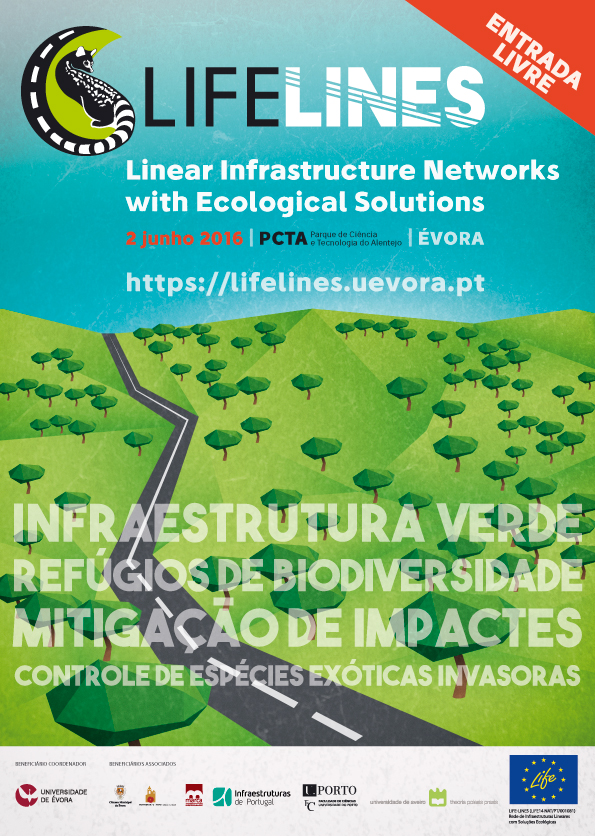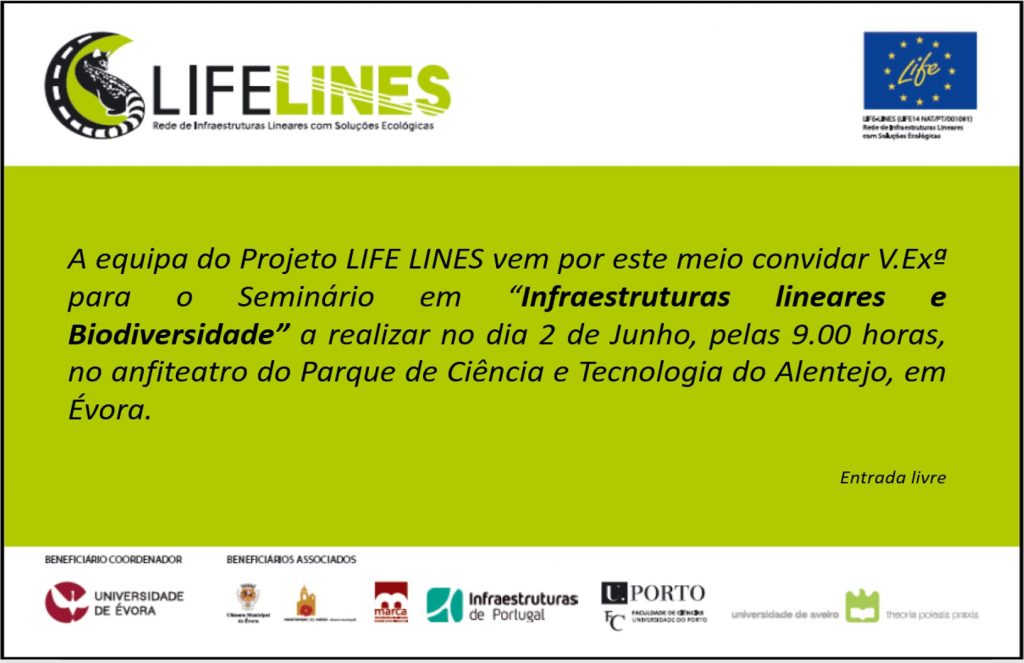LIFE LINES – Linear Infrastructure Networks with Ecological Solutions: PRESS RELEASE

Location, identification and collecting spectral data of invasive plant species
2016-05-12Flight to collect aerial photographs of the study area
2016-06-06On the next June 2, at 9 AM will take place the I International Seminar of LIFE LINES project, co-financed by the European Commission. This event will take place at auditorium of PCTA in Évora and are included in the first Monitoring Committee. This meeting integrates several national and international entities. In the morning the program is based in some communications about the presentation and development of the LIFE LINES project followed by a brief analysis and discussion. Some of the key questions to debate are the implementation of a green infrastructure along the roads, railways and power lines, the implementation of measures to minimize mortality and the barrier effect, the promotion of biodiversity refugees and the detection and control of plant invasive alien species along linear infrastructures. In the afternoon, national and europeans specialists in linear infrastructures ecology will present some of the most relevant applied work they have carried out, including more pragmatic ways of evaluate the permeability / connectivity of the landscape; efficiency of mitigation measures; examples of defragmentation measures adopted to the Iberian Lynx; interactions between fauna and High-speed trains; electrocution risk of birds of prey in power lines, etc. (see detailed program in attach). This session is free and open to the public.
Program
9.00 – Reception
9.30 – Opening ceremony
10.00 – The LIFE LINES project. (António Mira – Universidade de Évora)
10.30 – Measures to reduce fauna road kills: ledges in culverts, road-signs for amphibians and nets on road slopes to avoid rabbits colonization. (Graça Garcia – IP)
10.45 – Cartography of invasive plants and robotic monitoring solutions for animals’ road kills. (Neftalí Sillero – Universidade do Porto)
11.00 – Video as a dissemination tool in conservation. (Joaquim Pedro – Universidade de Aveiro)
11.15 – Towards sustainability in nature conservation-Autochthonous plant species and communities. (Marta Mattioli – MARCA ADL)
11.30 – Coffee break
12.00 – Discussion of LIFE LINES project.
13.00 – Lunch
14.30 – A pragmatic approach to evaluate permeability of transport infrastructure for wildlife (Andreas Seiler – IENE)
15.00 – Road mitigation: How effective are our measures? (Edgar van der Grift – Alterra)
15.30 – Wildlife and High Speed Railways interactions (Carme Rosell – Minuartia)
16.00 – Las medidas de desfragmentación para la fauna adoptadas en la Autovía A-381, Jerez-los Barrios (Cádiz) y las actuaciones en carreteras de Doñana dentro de un LIFE de conservación del lince ibérico. (Luis Ramajo Rodriguez – Agencia de Obra Pública. Junta de Andalucia)
16.30 – Coffee break
16.45 – Dead can move? Sampling effects on the identification of roadkill hotspots. (Sara Santos- CIBIO-UE)
17.00 – Conservation of species and natural habitats and the implementation of linear infrastuctures”. (Júlia Almeida – ICNF)
17.15 – Power-lines and birds – (Carlos Rochinha – EDP – Distribuição)
17.30 – Power-line electrocution risk map of endangered raptors – The study case of the black vulture (Aegypius monachus) and the imperial eagle (Aquila adalberti). (Samuel Infante – Quercus)
17.45 – Management by common people. (Henrique Pereira dos Santos – Montis )
18.00 – Closing Session


